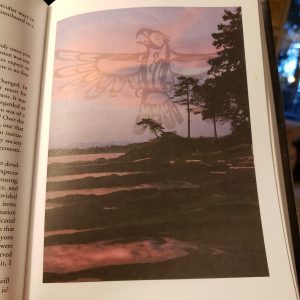
Calvin Helin is the son of a hereditary chief, and a member of the Tsimshian Nation from northern BC. He is an entrepreneur, Indigenous activist, lawyer, and community leader. I found this book, Dances with Dependency, in my local library. The back cover features strong endorsements by other Indigenous scholars and business leaders, so I thought it could be another useful source to help me understand the history of First Nations communities in Canada. Other lab members are also reading it, and may post their impressions below.
The book is divided into four parts, the first of which delves into the rich history and complex social interconnections that enabled different
Indigenous communities to thrive within the Pacific North West. The impression is of a series of proud and successful communities, each with their own sophisticated cultural practices and strongholds. These communities are both self-reliant, able to weather the storms, but also interdependent on each other for trade and resource management, woven together in complex economic and sociopolitical relationships. I hadn’t quite realised before how abundant this area had been in particular, and how important for Indigenous communities. Other sections of the book offer an unshrinking look at the devastating impact of disease, disempowerment, and forced welfare which collectively fracture Indigenous self-reliance and stymy the growth and power of Indigenous people. The final section of the book offers hope for the future, with a series of uplifting success stories of Indigenous communities from across North America and around the world. Central to all these positive outcomes was a genuine partnership between business/economic development and the local First Nation, plus bold and innovative thinking on the part of the First Nations leaders.
In addition to the many thought-provoking words, the book also contains beautiful artworks by Bill Helin, replete with meaning, which underline some of the key messages and offer space to reflect.
Catharine Winstanley, November 22nd 2021


Calvin Helin raises a lot of interesting points in his book, Dances with Dependency. I really enjoyed the historical perspective in the first half of the book. The statistics he reports describing the current situation for many Indigenous peoples of Canada are quite grim, and clearly change is needed. I reflected a lot on this book before writing out my thoughts because I certainly agree with some elements of his arguments. I can see how a shift in mindset away from dependency, and reforms to the democratic process for electing Indigenous leadership are necessary. Investing in self-sufficiency and education are clear ways forward.
That being said, I feel he glossed over the tremendous toll that colonization and the continuing oppression by the Canadian government takes on the mental wellbeing of Indigenous people. Colonization isn’t something that just happened in the distant past; it continues to this day. So I think, in order to move towards self-sufficiency and greater economic development, significant resources need to be allocated towards healing and recovery. It’s not just because of a dependency mindset that addiction, suicide rates, and poverty are high among Indigenous people. My second concern with Calvin Helin’s proposal for self-sufficiency is that he didn’t acknowledge climate change. It’s not possible to simply extract natural resources without thinking about our future, just for the sake of economic development. Invasive resource extraction and pipeline construction are also not necessarily the path forward for all Indigenous groups; the ongoing protests and resistance by the Wet’suwet’en people against the CGL pipeline and the RCMP demonstrate this. Overall though, it was a very interesting read and I really enjoyed pondering the ideas he presented.
Brett Hathaway, January 14 2022